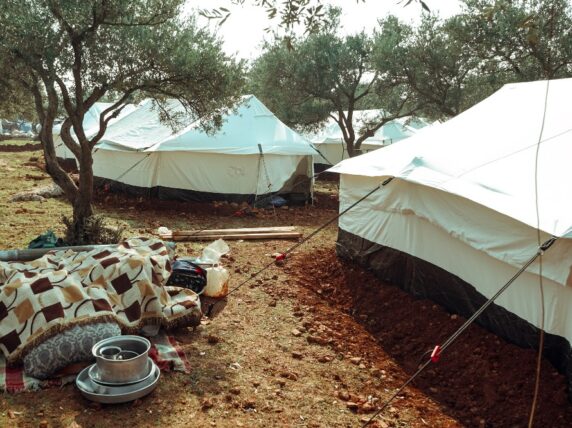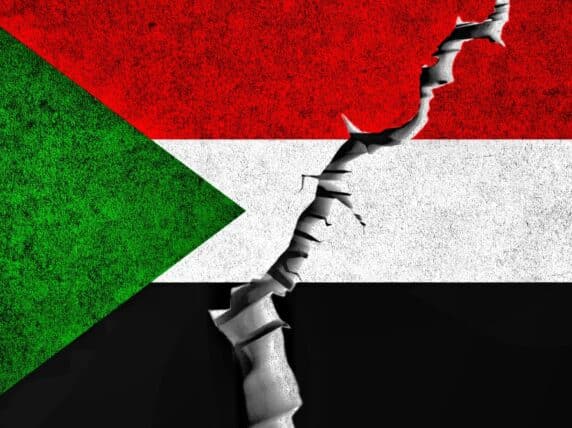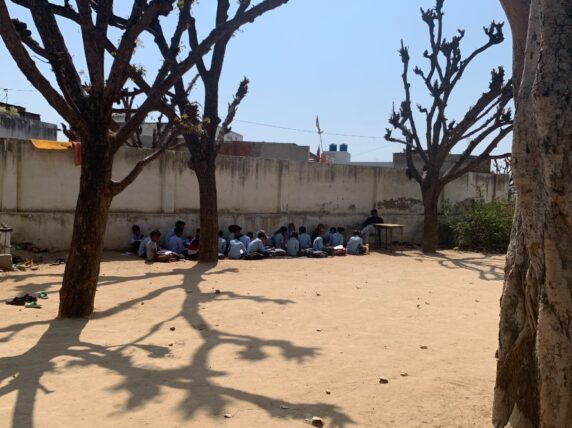The humanitarian crisis in Ukraine: what do we know so far?
As the conflict in Ukraine intensifies, so does the need for urgent humanitarian assistance. We look at what the UK is doing and how NGOs are responding.
Situation on the ground
Russian troops have invaded Ukraine’s capital, Kyiv, after a series of air attacks on cities and military bases around the country – forcing residents to seek shelter underground. The invasion began on 24 February and by the early hours of 26 February, frequent explosions could be heard in Kyiv from an unspecified location some distance from the city centre, according to the Reuters news agency.
At time of publication, the death toll in the Russian invasion of Ukraine is 352 civilians, including 14 children, according to Ukraine’s health ministry. The UN currently puts the civilian death toll at 136 people, including 13 children, but warns the real figure is likely to be “much higher”.
The Ukrainian president, Volodymyr Zelenskiy, said at a press briefing that his country would triumph over Russian forces, adding: “We are defending our land and the future of our children.”
With some 3 million people in Ukraine already in need of urgent humanitarian assistance even before the Russian military attack, immediate support is needed to prevent the country from spiralling even deeper into a humanitarian crisis that could impact millions of people.
The armed violence is causing widespread human suffering, civilian casualties, damage to civilian infrastructures, large-scale displacement and the exacerbation of the existing humanitarian needs stemming from years of conflict and the Covid-19 pandemic.
What is the UK doing?
On 27 February, Prime Minister Boris Johnson announced £40million of further humanitarian aid to Ukraine to provide vital medical supplies and other help, as well as wider economic and military support bolstering the Ukrainian resistance to the Russian invasion.
Downing Street says the funding will help aid agencies respond to the deteriorating humanitarian situation by providing Ukraine with medical supplies such as medicines, syringes, dressings and wound care packs. Government humanitarian experts will also be deployed to the region to support refugees fleeing the violence.
Subscribe to our newsletter
Our weekly email newsletter, Network News, is an indispensable weekly digest of the latest updates on funding, jobs, resources, news and learning opportunities in the international development sector.
Get Network NewsSecretary of State for Foreign, Commonwealth and Development Affairs Liz Truss has declined to say how many refugees from Ukraine the UK will accept but insists the Government is “urgently” looking at what more it can do.
On 1 March, Home Secretary Priti Patel announced that the UK is relaxing visa rules so that Ukrainians living in the UK will be able to bring in parents, grandparents, children over 18 and siblings.
On 2 March, Downing Street announced it would match donations from the public to the Disasters Emergency Committee (DEC) Ukraine appeal pound-for-pound starting with £20 million.
What is Bond calling for?
Bond is calling for the UK and world leaders to ensure humanitarian agencies have safe access to provide support to the people who need it.
We are also calling for the UK government to safeguard critical humanitarian and peacebuilding support by including appropriate exemptions for these activities into sanctions regimes.
The UK aid budget must return to 0.7% of GNI as soon as possible to ensure the UK has adequate funding to respond to multiple humanitarian crises around the world, including in Afghanistan, Yemen and Syria, as well as deliver on Official Development Assistance commitments through development programmes.
What are NGOs on the ground calling for?
The Disasters Emergency Committee (DEC): has launched an appeal for people fleeing the conflict. The DEC comprises 15 leading UK aid charities to raise funds to quickly and effectively respond to overseas disasters. “More than half a million people have fled their homes in Ukraine. They need food, water, shelter and medical assistance.”
Save the Children: “The war in Ukraine is forcing children and families in major cities into basements and bomb shelters to escape explosions. Children have already lived through eight years of conflict, enduring violence, shelling, and being displaced from their homes. Many families forced to flee will require help with their shelter, food, and clean water needs. We’re working quickly to assess what support children and families need and we’re ready to provide life-saving aid.”
UNICEF UK: “While the fighting continues, we provide support to children and their families affected by the conflict. Operating through four offices on both sides of the conflict, UNICEF: provides life-saving mine risk education to hundreds of thousands of children and their caregivers; supports the rehabilitation of schools damaged by the fighting; and provides more than 2.3 million people with access to safe water.”
CARE International: has partnered with ‘People in Need’ to provide emergency assistance to the people of Ukraine affected by this crisis. “The impact is already being felt by the ordinary people of Ukraine, many of whom were already struggling to pay for basic needs such as heating and food, and now are desperate to find a safe haven,” says Sofía Sprechmann Sineiro, CARE International Secretary-General.
Red Cross: “As the security situation allows, the Ukrainian Red Cross Society (URCS) and the International Committee of the Red Cross (ICRC) will continue to respond to existing and emerging humanitarian needs. The Red Cross has supported people affected by this conflict for years and this will not stop now.”
Halo Trust: CEO James Cowan said: “The HALO Trust is deeply concerned by the escalation of hostilities in Ukraine. Our thoughts are with our 430 local staff and their families at this difficult time. We would remind all parties to the conflict that HALO is a neutral, humanitarian organisation that removes the deadly debris of war to prevent suffering and protect civilians. We have been making communities safe in eastern Ukraine since 2016 and we will return to work wherever we are needed as soon as the situation allows.”
International Planned Parenthood Federation (IPPF): Director-General Dr Alvaro Bermejo says they are “deeply concerned,” adding, “We take our responsibility to preserve the enormous gains made in life-saving sexual and reproductive healthcare across the country very seriously, especially for women, girls and marginalised populations, whose vulnerability and experiences are so often overlooked in humanitarian situations.”
Children on the Edge: “Tens of thousands of Ukrainians have been fleeing the Russian invasion in their country and crossing the borders into Romania and Moldova where our local partner organisations are providing food, clothing and shelter.”
Theirworld: Sarah Brown, Chair, said: “Theirworld stands alongside our NGO partners and the international community in its call to end violence, protect the rights of children, take special measures to protect schools, hospitals, and childcare facilities, and provide support to refugees – including a continuity of education and psychosocial support for children displaced due to the humanitarian emergency.”
Doctors of the World: has been providing humanitarian assistance and health services to vulnerable people living along the line of contact between Luhansk and Donetsk Oblasts in eastern Ukraine for almost eight years. “We intend to continue to serve the population as soon as the situation stabilises and our teams are able to work in the area again.”
International Rescue Committee (IRC): “The current escalation in conflict will have devastating consequences for the civilian population in Ukraine and humanitarian needs are expected to rise. The IRC is on the ground in Poland, working with our local partners in Poland and Ukraine, to quickly mobilise resources that will provide life-saving support to civilians forced to flee their homes.”
The Scottish Catholic International Aid Fund: Alistair Dutton, Chief Executive, said: “Within one week, Russia’s invasion of Ukraine has driven hundreds of thousands of people from their homes. Now they are fleeing for their lives, desperately afraid and clueless as to what the future holds. As we watch the unfolding events in horror, we know that people want to help. We are launching an emergency appeal to help the people of Ukraine and we urge people here in Scotland to show their solidarity and give generously.”
Action Against Hunger: “The organisation warns of the growing humanitarian impacts of the conflict, which could have a devastating impact on people’s ability to access health services, shelter, clean water, hygiene, safe sanitation, and food.”
Age International: Victoria Panchenko, Area Manager for their Ukraine partner, HelpAge International, said they have been working in Ukraine since the conflict began, providing support to older people in the east of the country. “There are 17 HelpAge staff in Ukraine, most of whom are in the east. Almost all the locations where HelpAge operates are within the five-kilometre demarcation line in Ukrainian government-controlled territory.”
Concern Worldwide: “Our emergency teams are on the ground, working with Alliance2015 (a strategic network of eight European non-government organisations engaged in humanitarian and development action) and national NGOs to support a timely, effective regional response to the growing level of humanitarian needs.”
Mercy Corps: is preparing to respond and is currently mobilizing a team to the region – first to Romania and Poland and then, depending on safety and access, into Ukraine – to better understand the evolving humanitarian needs as this situation unfolds. They anticipate providing emergency cash assistance as well as supporting local organisations that know their community’s needs best.
International Alert: supports ceasefire calls in Ukraine. Executive Director Nic Hailey said: “We stand in solidarity with civil society in Ukraine and across the region… Rapid de-escalation must remain everyone’s priority. We support Monday’s call from UN Secretary General Guterres for an immediate ceasefire, and for diplomacy and dialogue to prevail.”
Humanity & Inclusion: has deployed a team of emergency experts to Ukraine and neighbouring countries to assess the humanitarian needs. George Graham, CEO of Humanity & Inclusion UK, said: “Most of the people killed or injured are civilians. Widespread bombing causes complex injuries and psychological trauma. Populations are displaced and vital infrastructure like schools, hospitals, bridges, electricity supply, and clean water supply are destroyed. Contamination by explosive remnants is left behind, and can threaten the population for decades. There is only one solution: to stop the use of explosive weapons in populated areas.”
Plan International UK: has launched an emergency appeal calling on the UK public to support its work with vulnerable children and their families affected by the war in Ukraine. Rose Caldwell, Chief Executive, said: “We are deeply concerned for the lives and wellbeing of the children and young people of Ukraine and join international calls for an immediate cessation of hostilities.”
UK-MED: Dr Ram Vadi, UK-Med’s Health Director, and Tom Godfrey, UK-Med’s Humanitarian Operations Director, are travelling to Warsaw to assess and anticipate the emergency health needs caused by the rapidly unfolding humanitarian crisis in Ukraine and its neighbouring countries.
“The impact on all those affected will be devastating,” David Wightwick, CEO of UK-Med says. “That’s why it’s vital we send our advanced team into Poland to urgently assess the situation and how we can best support those most in need as a result of this unfolding crisis. Europe is on the brink of a humanitarian catastrophe.”
Y Care International: has launched an urgent appeal to support the response to the crisis in Ukraine. Donations made to the appeal will ensure that vital humanitarian assistance is available to those who need it, through YMCA Europe, YMCAs in Ukraine and neighbouring countries.
All We Can and The Methodist Church in Britain: have launched an emergency appeal in response to events unfolding in Ukraine. Working together with the Global Relationships Team of the Methodist Church in Britain, donations will be used to support the response to the crisis, and ensure that critical humanitarian assistance is available to those who need it within Ukraine and those who have fled to the surrounding countries.
World Vision: although they are not currently working in Ukraine, they are scoping out potential partners there who they can work through. They are working in Romania, Moldova and Georgia where Ukrainian refugees are arriving and have already launched a support response to the crisis.
Category
News & Views



